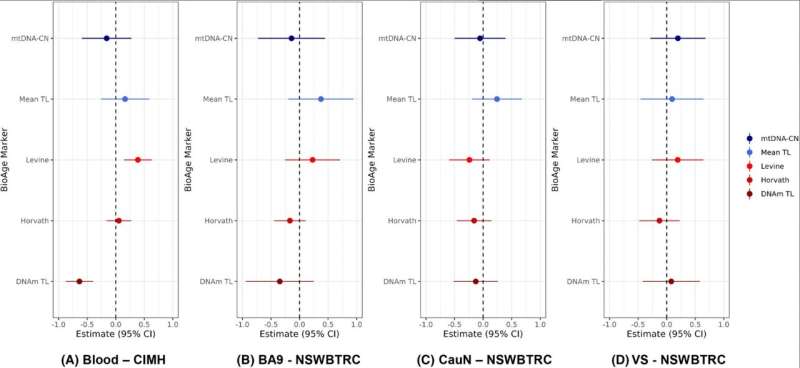
Epigenetic age estimates in AUD based on linear regression models for different BioAge markers in (A) whole blood, (B) Brodmann Area 9 (BA9; part of the prefrontal cortex), (C) caudate nucleus (CauN), and (D) ventral striatum (VS) while adjusting for covariates. Error bars represent the confidence interval (CI). CIMH cohort: N = 179 blood samples, NSWBTRC cohort: N = 91 BA9 samples, N = 94 CauN samples, and N = 63 VS samples. Credit: Alcohol, Clinical and Experimental Research (2024). DOI: 10.1111/acer.15241
The brains and blood of people with a history of excessive drinking show cellular evidence of premature aging. In a new study published in Alcohol: Clinical and Experimental Research, DNA taken from people with alcohol use disorder showed signs of changes in genetic regions indicative of increased biological age. Accelerated biological aging may help explain why excessive alcohol use has been shown to be a significant risk factor for premature death and neurodegenerative diseases.
Scientists extracted DNA from the brains of 144 deceased individuals with alcohol use disorder as well as from blood samples of 200 men with and without alcohol use disorder. They ran analyses on the samples to assess certain markers of biological age, specifically telomere length, epigenetic clocks, and mitochondrial DNA counts. Epigenetic clocks are machine learning-based algorithms designed to identify the deterioration of biological functions, signifying biological aging.
The study found that people with alcohol use disorder showed increased biological age in the BA9 region of the brain, which plays a role in executive control and working memory. The epigenetic clock associated with this finding is designed to capture changes that occur due to environmental and disease processes. This finding may suggest increased inflammation in the brains of individuals with alcohol use disorder.
Blood samples showed increased biological age as measured by epigenetic clocks in individuals with alcohol use disorder. Across all subsets, most markers of biological age showed small to medium statistically significant correlations with chronological age in both the blood and the brain samples. Shorter telomere length and shorter DNA methylation telomere length were indicative of older chronological age.
This is the first study to analyze blood and brain samples simultaneously using multiple measures of biological aging in people with alcohol use disorder. As alcohol use disorder is thought to be a disorder of the brain, the researchers for this study examined tissue from three regions of the brain associated with addiction processes.
The BA9 region in the frontal cortex plays a role in working memory and executive control, the ventral striatum is associated with the rewarding effects of drugs, and the caudate nucleus plays a role in habit formation. Previous studies have shown increased biological age in blood samples of people with alcohol use disorder.
Follow-up studies with larger and diverse samples, ideally with blood and brain samples from the same individual, and detailed phenotypic information about alcohol intake, AUD-related symptoms, and age at onset are needed to provide more insight into the mechanisms of accelerated biological aging in AUD.
More information:
Lea Zillich et al, Biological aging markers in blood and brain tissue indicate age acceleration in alcohol use disorder, Alcohol, Clinical and Experimental Research (2024). DOI: 10.1111/acer.15241
Citation:
Signs of accelerated aging found in brains of individuals with alcohol use disorder (2024, January 26)
retrieved 28 January 2024
from https://medicalxpress.com/news/2024-01-aging-brains-individuals-alcohol-disorder.html
This document is subject to copyright. Apart from any fair dealing for the purpose of private study or research, no
part may be reproduced without the written permission. The content is provided for information purposes only.
>>> Read full article>>>
Copyright for syndicated content belongs to the linked Source : Medical Xpress – https://medicalxpress.com/news/2024-01-aging-brains-individuals-alcohol-disorder.html










